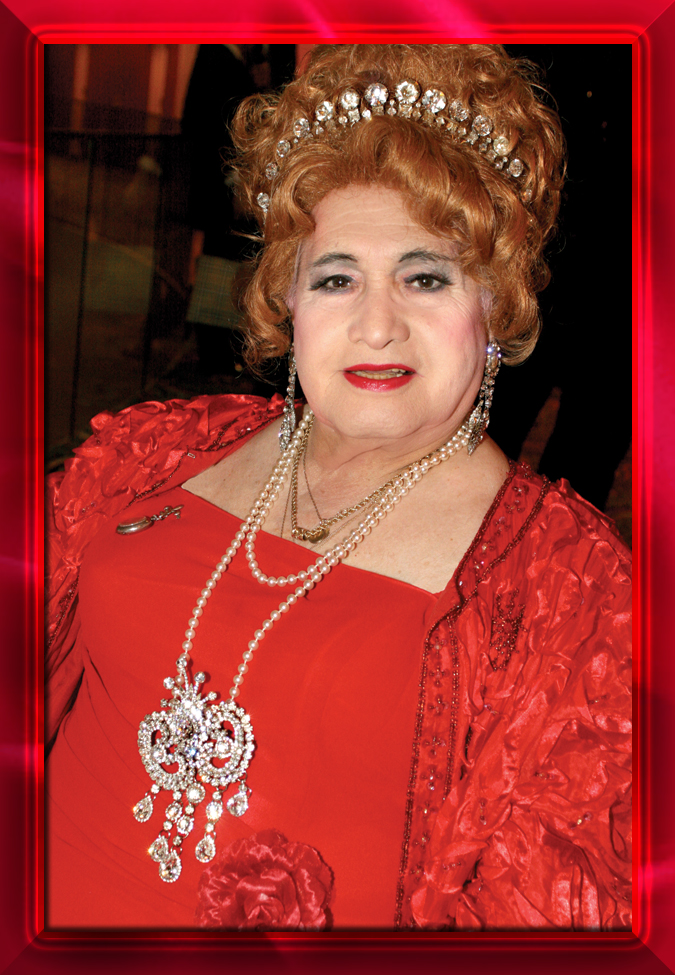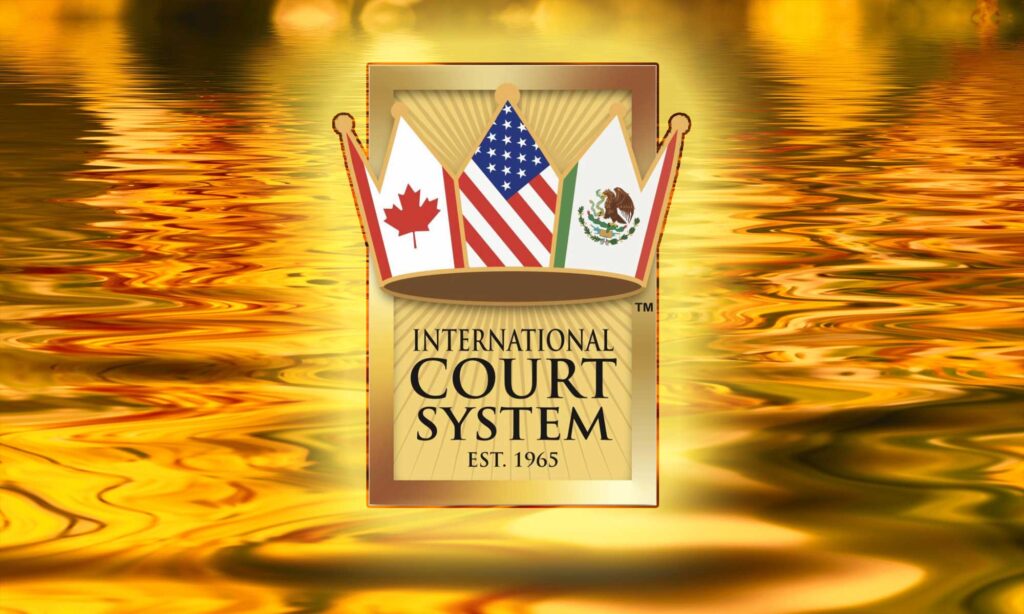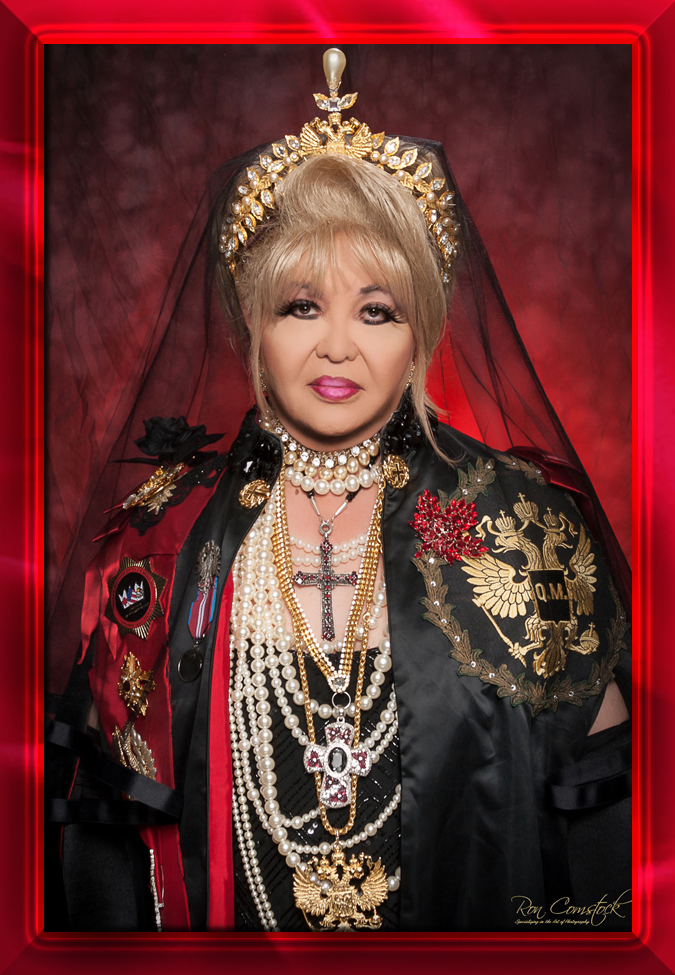The International Court System was founded in San Francisco in 1965 by José Sarria, also known as Absolute Empress I, The Widow Norton. Sarria, now affectionately known as “Mama” or “Mama José” among Imperial Court members, devised the name “Widow Norton” as a reference Joshua Norton, a much-celebrated citizen of 19th Century San Francisco who had declared himself Emperor of the United States and Protector of Mexico in 1859.
Sarria soon became the nexus of a fundraising group with volunteer members bearing titles of nobility bestowed by yearly elected leaders. Around 1971, this structure was replicated in Vancouver, Canada. In the United States, the first court outside of San Francisco was Portland, Oregon and was followed closely by Los Angeles. Other Imperial Courts were founded thereafter. These empires operated and formed policies more-or-less independently until an Imperial Court Council lead by Sarria was formed to prevent participation by groups that were not involved strictly and solely involved with charitable fundraising.
For many years certain chapters remained outside the recognition of the Widow Norton and the Imperial Court Council for various reasons, particularly groups in Canada loyal to Ted Northe, a founder of the Vancouver chapter who was known for some time as “Empress of Canada”. Eventually these chapters reconciled their differences with Sarria’s group and joined the IICS. In 1997, Northe was among the recipients of the “José Honors Award”, a prestigious recognition granted by Sarria in a special ceremony held on that first year it was given in Boston, Massachusetts.
Each individual court chapter (or “realm”) is a separate, legally incorporated charitable non-profit organization that raises funds and awareness for various charities and people in need within its realm. Each chapter has its own board of directors and is financially responsible for its own management. In addition to local non-profit status, many courts in the United States have Federal 501(c) status.
The Imperial Court Council is a separately incorporated non-profit organization created to advise individual chapters and, when necessary, to grant or rescind recognition by the IICS as a whole. This group also urges a degree of consistency regarding matters of protocol via proclamations which are generally observed by all chapters.
On 17 February 2007, Sarria (who turned 84 years old in December 2006) officially passed IICS leadership to Nicole the Great, (real name Nicole Murray-Ramirez), former 1st Heir Apparent, in a ceremony held in Seattle, Washington.
Most chapters are Imperial Courts and are also known as “empires”. A few chapters are called “ducal court” (infrequently called a “duchy”) or “barony” (infrequently called a “baronial court”). The term ducal court is typically used in the rare situation when one chapter’s area overlaps with the territory of an already established chapter, as is the case with the Ducal Court of San Francisco. The term barony is typically used when a new chapter has yet to fully realize the level of infrastructure and successful fundraising characteristic of those chapters deemed full-fledged Imperial Courts. Except for the titles used by the monarchs (i.e. baroness rather than empress, etc.) baronial and ducal chapters function in essentially the same way as those chapters headed by emperor and empresses.
Each court holds an annual coronation which is usually the chapter’s largest fundraiser and is attended by both local people and members of other chapters from across North America. The focal point of the evening is the actual coronation ceremony in which the new emperor and empress are crowned. The method by which monarchs are selected varies from chapter to chapter, ranging from selection by vote among the active membership in closed session months before the coronation to election by all in attendance on the night of the ceremony.
The office of monarch is taken very seriously within the court system and requires a large commitment of the holder’s time and money. Accordingly, while the presence of an “imperial couple” is the norm, it is not uncommon for an emperor or empress to reign alone depending on the availability of suitably dedicated and charismatic candidates with the necessary resources to fulfil the requirements of a one year reign.
In the most frequent case, several weeks after coronation the new monarch or monarchs give out court titles at a fundraiser called investitures. The titles given to members vary from one chapter to another and are primarily left to the discretion of the reigning monarch or monarchs.
Typical titles awarded are Imperial Crown Prince, Grand Duchess, Marquess, Viscount, etc. Other appellations bestowed resemble offices or professions within a medieval or modern noble court rather than titles of nobility, such as “Court Jester” or “Chancellor of the Realm” and so forth. These titles may be as serious-sounding or as humorously campy as the monarchs wish. Titles are traditionally based upon those used by European nobility (especially the British Peerage) but nothing prohibits the creation of titles such as czarina, raja or sultan and these are sometimes used as well.
Noble titles are ranked according to an order of precedence so that, for example, a member who has been created a duke takes precedence over a member who has been made countess. The main effect of this hierarchy involves the order that members are introduced during “protocol”, a ceremonial procedure endemic to the Imperial Court in which titles are read by the master of ceremonies as members approach the presiding monarchs. This bit of pageantry, which is typically reserved for coronations and similar large events, gives Imperial Court members an opportunity to display their titles and costumes to the assembled crowd.
While largely made up of gays and lesbians, each court is open to anyone wishing to help raise money for charities. Gay, lesbian, bisexual, transgender and heterosexual people have all served as monarchs and court members in the system’s history.
Although drag queens, transvestites and cross-dressers are especially well-represented within the Imperial Court (collectively comprising about 50% of the total membership), the organization also attracts large numbers of men and women who dress in a manner traditional to their gender. This typically means suits and tuxedos for men and dresses and gowns for women.




